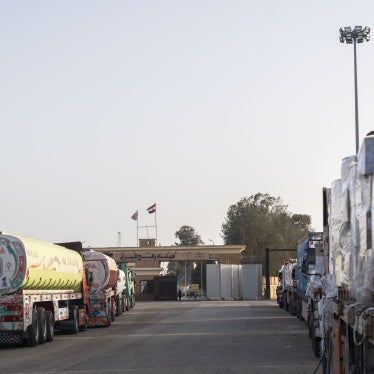We are writing to express our profound concern at reports this week that Egyptian border guards killed three migrants who appeared to be Sudanese nationals in a particularly brutal manner.
Your Excellency:
We are writing to express our profound concern at reports this week that Egyptian border guards killed three migrants who appeared to be Sudanese nationals in a particularly brutal manner.
We urge you immediately to take the following actions: 1) order a full investigation of the reported shootings and beatings of Sudanese migrants attempting to cross from Egypt into Israel the night of August 1; 2) invite independent international investigators, namely the United Nations special rapporteur on the human rights of migrants and the special rapporteur on extrajudicial, summary or arbitrary executions, to examine this and any other reported incidents involving allegations of excessive force against migrants; and 3) provide public assurances that you will treat humanely third-country nationals apprehended at the border and will not return them to any country where their lives would be threatened, or they would face risk of torture or persecution.
We further call on you to prosecute anyone identified as having unlawfully killed or injured any migrants through shooting or beating, and to hold accountable any other Egyptian official bearing responsibility for such incidents. You should make the results of your investigation and the actions you have taken, public as soon as possible.
We also ask that you provide us with information about a reported agreement reached between President Mubarak and Prime Minister Olmert relating to the treatment of Sudanese or other third country nationals at the border with Israel or who have entered Israel from Egypt. We are particularly interested to learn if such an agreement specified actions that Egyptian border authorities will take to prevent or deter unauthorized third-country nationals from crossing into Israel and whether it provided assurances to Israel regarding the treatment of third-country nationals returned from Israel to Egypt. If this is a written agreement, we would greatly appreciate receiving a copy of the text.
Israel’s Channel 10 TV, Ha'aretz, The Jerusalem Post, and the Associated Press reported on what appeared to be killings of three migrants on the night of August 1. The reports cited border surveillance footage and eyewitness accounts of Israeli soldiers. The soldiers reportedly said that Egyptian soldiers shot two persons, apparently instantly killing one, and then caught and beat to death the wounded man as well as a third person. The Israeli soldiers described a “tug-of-war” in which the soldiers struggled for control of one of the men whom they allegedly beat to death.
We also note the allegations reported in Ha'aretz (edition July 23) that on July 22, 2007, Egyptian police shot Haja Abbas Haroun, a 28-year-old from Darfur, who was trying to enter Israel from the town of Al-Aouja,. The Ha'aretz report also said that police shot others in the party of 20, including a young girl who was reportedly critically injured.
The use of force by state security forces is governed by international standards, and subject to international legal obligations which are binding on Egypt. Egypt is a party to the International Covenant on Civil and Political Rights (ICCPR), which prohibits in Article 6 (1) arbitrary killings including those resulting from unlawful or excessive use of force. This prohibition imposes an obligation on states to investigate, and where appropriate prosecute, any such alleged killings. Article 7 of the ICCPR also prohibits the use of torture or other inhuman or degrading treatment, and similarly creates obligations to investigate and prosecute. Egypt also has specific and binding obligations as a party to the UN Convention Against Torture, which prohibits resort to force amounting to inhuman and degrading treatment or torture, and requires states to investigate and prosecute any alleged incidents.
In its investigations Egypt should have regard to the standards set out by the UN governing the use of force. The U.N. Code of Conduct for Law Enforcement Officials states that "law enforcement officials may use force only when strictly necessary and to the extent required for the performance of their duty." The U.N. Basic Principles on the Use of Force and Firearms provide that law enforcement officials “shall, as far as possible, apply non-violent means before resorting to the use of force” and may use force “only if other means remain ineffective.” When the use of force is unavoidable, law enforcement officials must “exercise restraint in such use and act in proportion to the seriousness of the offence.”
We would greatly appreciate your prompt attention and response to these very serious allegations.
Sincerely,
/s/
Bill Frelick
Refugee Policy Director
/s/
Sarah Leah Whitson
Middle East and North Africa Director








